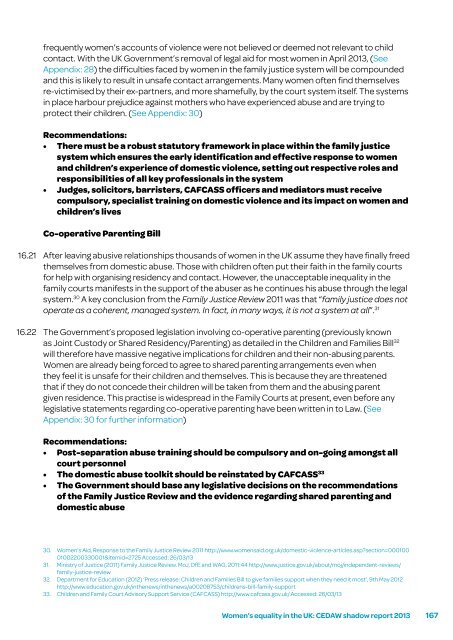Women’s equality in the UK – A health check
Women’s equality in the UK – A health check
Women’s equality in the UK – A health check
Create successful ePaper yourself
Turn your PDF publications into a flip-book with our unique Google optimized e-Paper software.
16.21<br />
16.22<br />
frequently women’s accounts of violence were not believed or deemed not relevant to child<br />
contact. With <strong>the</strong> <strong>UK</strong> Government’s removal of legal aid for most women <strong>in</strong> April 2013, (See<br />
Appendix: 28) <strong>the</strong> difficulties faced by women <strong>in</strong> <strong>the</strong> family justice system will be compounded<br />
and this is likely to result <strong>in</strong> unsafe contact arrangements. Many women often f<strong>in</strong>d <strong>the</strong>mselves<br />
re-victimised by <strong>the</strong>ir ex-partners, and more shamefully, by <strong>the</strong> court system itself. The systems<br />
<strong>in</strong> place harbour prejudice aga<strong>in</strong>st mo<strong>the</strong>rs who have experienced abuse and are try<strong>in</strong>g to<br />
protect <strong>the</strong>ir children. (See Appendix: 30)<br />
Recommendations:<br />
• There must be a robust statutory framework <strong>in</strong> place with<strong>in</strong> <strong>the</strong> family justice<br />
system which ensures <strong>the</strong> early identification and effective response to women<br />
and children’s experience of domestic violence, sett<strong>in</strong>g out respective roles and<br />
responsibilities of all key professionals <strong>in</strong> <strong>the</strong> system<br />
• Judges, solicitors, barristers, CAFCASS officers and mediators must receive<br />
compulsory, specialist tra<strong>in</strong><strong>in</strong>g on domestic violence and its impact on women and<br />
children’s lives<br />
Co-operative Parent<strong>in</strong>g Bill<br />
After leav<strong>in</strong>g abusive relationships thousands of women <strong>in</strong> <strong>the</strong> <strong>UK</strong> assume <strong>the</strong>y have f<strong>in</strong>ally freed<br />
<strong>the</strong>mselves from domestic abuse. Those with children often put <strong>the</strong>ir faith <strong>in</strong> <strong>the</strong> family courts<br />
for help with organis<strong>in</strong>g residency and contact. However, <strong>the</strong> unacceptable <strong>in</strong><strong>equality</strong> <strong>in</strong> <strong>the</strong><br />
family courts manifests <strong>in</strong> <strong>the</strong> support of <strong>the</strong> abuser as he cont<strong>in</strong>ues his abuse through <strong>the</strong> legal<br />
system. 30 A key conclusion from <strong>the</strong> Family Justice Review 2011 was that “family justice does not<br />
operate as a coherent, managed system. In fact, <strong>in</strong> many ways, it is not a system at all”. 31<br />
The Government’s proposed legislation <strong>in</strong>volv<strong>in</strong>g co-operative parent<strong>in</strong>g (previously known<br />
as Jo<strong>in</strong>t Custody or Shared Residency/Parent<strong>in</strong>g) as detailed <strong>in</strong> <strong>the</strong> Children and Families Bill 32<br />
will <strong>the</strong>refore have massive negative implications for children and <strong>the</strong>ir non-abus<strong>in</strong>g parents.<br />
Women are already be<strong>in</strong>g forced to agree to shared parent<strong>in</strong>g arrangements even when<br />
<strong>the</strong>y feel it is unsafe for <strong>the</strong>ir children and <strong>the</strong>mselves. This is because <strong>the</strong>y are threatened<br />
that if <strong>the</strong>y do not concede <strong>the</strong>ir children will be taken from <strong>the</strong>m and <strong>the</strong> abus<strong>in</strong>g parent<br />
given residence. This practise is widespread <strong>in</strong> <strong>the</strong> Family Courts at present, even before any<br />
legislative statements regard<strong>in</strong>g co-operative parent<strong>in</strong>g have been written <strong>in</strong> to Law. (See<br />
Appendix: 30 for fur<strong>the</strong>r <strong>in</strong>formation)<br />
Recommendations:<br />
• Post-separation abuse tra<strong>in</strong><strong>in</strong>g should be compulsory and on-go<strong>in</strong>g amongst all<br />
court personnel<br />
• The domestic abuse toolkit should be re<strong>in</strong>stated by CAFCASS 33<br />
• The Government should base any legislative decisions on <strong>the</strong> recommendations<br />
of <strong>the</strong> Family Justice Review and <strong>the</strong> evidence regard<strong>in</strong>g shared parent<strong>in</strong>g and<br />
domestic abuse<br />
30. <strong>Women’s</strong> Aid, Response to <strong>the</strong> Family Justice Review 2011 http://www.womensaid.org.uk/domestic-violence-articles.asp?section=000100<br />
01002200330001&itemid=2725 Accessed: 26/03/13<br />
31. M<strong>in</strong>istry of Justice (2011) Family Justice Review. MoJ, DfE and WAG, 2011:44 http://www.justice.gov.uk/about/moj/<strong>in</strong>dependent-reviews/<br />
family-justice-review<br />
32. Department for Education (2012) ‘Press release: Children and Families Bill to give families support when <strong>the</strong>y need it most’, 9th May 2012<br />
http://www.education.gov.uk/<strong>in</strong><strong>the</strong>news/<strong>in</strong><strong>the</strong>news/a00208753/childrens-bill-family-support<br />
33. Children and Family Court Advisory Support Service (CAFCASS) http://www.cafcass.gov.uk/ Accessed: 26/03/13<br />
<strong>Women’s</strong> <strong>equality</strong> <strong>in</strong> <strong>the</strong> <strong>UK</strong>: CEDAW shadow report 2013 167


